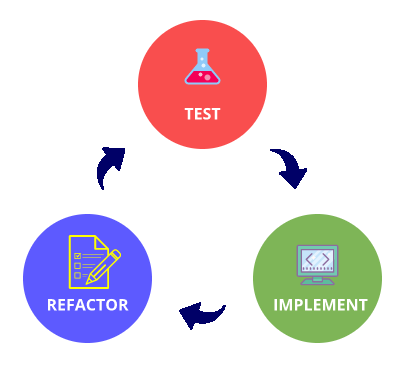
Test-driven development is not about testing. Test-driven development is about development (and design), specifically improving the quality and design of code. The resulting unit tests are just an extremely useful by-product.
TDD life-cycle
Before explaining best practices, it is important to understand the TDD life-cycle.
- Write the test
- Run the test (there is no implementation code, test does not pass)
- Write just enough implementation code to make the test pass
- Run all tests (tests pass)
- Refactor
- Repeat

Result
HelloWorldTest.java
package com.damienfremont.blog;
import com.damienfremont.blog.utils.JUnit5Parent;
import org.junit.jupiter.api.*;
import org.junit.jupiter.params.ParameterizedTest;
import org.junit.jupiter.params.provider.CsvSource;
@DisplayNameGeneration(DisplayNameGenerator.ReplaceUnderscores.class)
public class HelloWorld6FinalTest extends JUnit5Parent {
@Test
void print_Hello_World_by_default() {
String expected = "Hello, World!!";
HelloWorld6Final.main(null);
Assertions.assertEquals(expected, getOutput());
}
@DisplayName("print Hello with parameter (expected, parameter)")
@ParameterizedTest
@CsvSource({
"'Hello, Damien!', Damien",
"'Hello, Jane!', Jane",
"'Hello, John!', John",
})
void print_Hello_with_parameter(String expected, String parameter) {
String[] args = {parameter};
HelloWorld6Final.main(args);
Assertions.assertEquals(expected, getOutput());
}
@DisplayName("exception bad format (description, expected, parameter)")
@ParameterizedTest
@CsvSource({
"Param is empty, bad arg (ex: Damien), '' ",
"Param is blanck, bad arg (ex: Damien), ' ' ",
"Param is null, bad arg (ex: Damien), null"
})
void exception_bad_format(String description, String expected, String parameter) {
String[] args = {parameter.equals("null") ? null : parameter};
Exception e = Assertions.assertThrows(IllegalArgumentException.class, () -> {
HelloWorld6Final.main(args);
});
Assertions.assertEquals(expected, e.getMessage());
}
}
Specifications
This tutorial will implement the following specifications.
- Print “Hello, World!”
- Print “Hello,
!", where is a parameter - If parameter is not present, Print “Hello, World!”
- If parameter is not null or empty, then exception “bad arg (ex: Damien)”
Steps
Order is important, next step is also solution to previous step.
(in Git Projet, Just follow classes named HelloWorld*Test order)
- Start by developing
Print "Hello, World!"HelloWorldTest#print_Hello_WorldComplete the testHelloWorldTest#print_Hello_WorldRun the test (test does not pass)HelloWorldWrite just enough implementation code to make the test pass
- Repeat with
Print "Hello, <MY NAME>!", where <MY NAME> is a parameterHelloWorldTest#print_Hello_with_parameterComplete the testHelloWorldTest#print_Hello_with_parameterRun the test (test does not pass)HelloWorldWrite just enough implementation code to make the test passHelloWorldTest#*Run all tests (tests pass)
- Repeat with
If parameter is not present, Print "Hello, World!"HelloWorldTest#print_Hello_World_by_defaultComplete the testHelloWorldTest#print_Hello_World_by_defaultRun the test (test does not pass)HelloWorldWrite just enough implementation code to make the test passHelloWorldTest#*Run all tests (tests pass)
- Refactor
HelloWorldTestMigrate to JUnit5HelloWorldUse Ternary operator for inline condition
- Repeat with
If parameter is not null or empty, then exception "bad arg (ex: Damien)"HelloWorldTest#exception_bad_formatComplete the testHelloWorldTest#exception_bad_formatRun the test (test does not pass)HelloWorldWrite just enough implementation code to make the test passHelloWorldTest#*Run all tests (tests pass)
Step 0 - Initial commit
HelloWorld.java
package com.damienfremont.blog;
public class HelloWorld {
public static void main(String[] args) {
// TODO: NEXT: Print "Hello, World!"
}
}
Step 1
Start by developing Print "Hello, World!"
HelloWorldTest.java
package com.damienfremont.blog;
import com.damienfremont.blog.utils.JUnit4Parent;
import org.junit.Test;
public class HelloWorldTest extends JUnit4Parent {
@Test
public void print_Hello_World() {
throw new IllegalStateException("Not yet implemented!");
// TODO: NEXT OUTPUT: super.getOutput()
}
}
Run the test (test does not pass)

Complete the test
HelloWorldTest.java
package com.damienfremont.blog;
import com.damienfremont.blog.utils.JUnit4Parent;
import org.junit.Assert;
import org.junit.Test;
public class HelloWorld1Test extends JUnit4Parent {
@Test
public void print_Hello_World() {
String expected = "Hello, World!";
HelloWorld1.main(null);
Assert.assertEquals(expected, getOutput());
}
}
Run the test (test does not pass)

Write just enough implementation code to make the test pass
HelloWorld.java
package com.damienfremont.blog;
public class HelloWorld1 {
public static void main(String[] args) {
String text = "Hello, World!";
System.out.println(text);
}
}

Step 2
Repeat with Print "Hello, <MY NAME>!", where <MY NAME> is a parameter
HelloWorldTest.java
package com.damienfremont.blog;
import com.damienfremont.blog.utils.JUnit4Parent;
import org.junit.Assert;
import org.junit.Test;
public class HelloWorld2Test extends JUnit4Parent {
@Test
public void print_Hello_World() {
String expected = "Hello, World!";
HelloWorld2.main(null);
Assert.assertEquals(expected, getOutput());
}
@Test
public void print_Hello_with_parameter() {
throw new IllegalStateException("Not yet implemented!");
// TODO: NEXT: Print "Hello, <MY NAME>!", where <MY NAME> is a parameter
}
}
Complete the test
HelloWorldTest.java
package com.damienfremont.blog;
import com.damienfremont.blog.utils.JUnit4Parent;
import org.junit.Assert;
import org.junit.Test;
import org.junit.runner.RunWith;
import org.junit.runners.Parameterized;
import java.util.Arrays;
import java.util.Collection;
@RunWith(Parameterized.class)
public class HelloWorld2Test extends JUnit4Parent {
@Parameterized.Parameters
public static Collection<Object[]> data() {
return Arrays.asList(new Object[][]{
{"Hello, World!", "World"},
{"Hello, Damien!", "Damien"},
{"Hello, Jane!", "Jane"},
{"Hello, John!", "John"},
});
}
private final String expected;
private final String first;
public HelloWorld2Test(String expected, String first) {
this.first = first;
this.expected = expected;
}
@Test
public void print_Hello_with_parameter() {
String[] args = {first};
HelloWorld2.main(args);
Assert.assertEquals(expected, getOutput());
}
}
Run the test (test does not pass)

Write just enough implementation code to make the test pass
HelloWorld.java
package com.damienfremont.blog;
public class HelloWorld2 {
public static void main(String[] args) {
String text = args[0];
System.out.println(String.format("Hello, %s!", text));
}
}

Step 3
Repeat with If parameter is not present, Print "Hello, World!"
HelloWorldTest.java
package com.damienfremont.blog;
import com.damienfremont.blog.utils.JUnit4Parent;
import org.junit.Assert;
import org.junit.Test;
import org.junit.runner.RunWith;
import org.junit.runners.Parameterized;
import java.util.Arrays;
import java.util.Collection;
@RunWith(Parameterized.class)
public class HelloWorld3Test extends JUnit4Parent {
@Parameterized.Parameters
public static Collection<Object[]> data() {
return Arrays.asList(new Object[][]{
{"Hello, World!", "World"},
{"Hello, Damien!", "Damien"},
{"Hello, Jane!", "Jane"},
{"Hello, John!", "John"},
});
}
private final String expected;
private final String first;
public HelloWorld3Test(String expected, String first) {
this.first = first;
this.expected = expected;
}
@Test
public void print_Hello_with_parameter() {
String[] args = {first};
HelloWorld3.main(args);
Assert.assertEquals(expected, getOutput());
}
@Test
public void print_Hello_World_by_default() {
throw new IllegalStateException("Not yet implemented!");
// TODO: NEXT: If parameter is not present, Print "Hello, World!"
}
}
Complete the test
HelloWorldTest.java
package com.damienfremont.blog;
import com.damienfremont.blog.utils.JUnit4Parent;
import org.junit.Assert;
import org.junit.Test;
import org.junit.runner.RunWith;
import org.junit.runners.Parameterized;
import java.util.Arrays;
import java.util.Collection;
@RunWith(Parameterized.class)
public class HelloWorld3Test extends JUnit4Parent {
@Parameterized.Parameters
public static Collection<Object[]> data() {
return Arrays.asList(new Object[][]{
{"Hello, World!", "World"},
{"Hello, Damien!", "Damien"},
{"Hello, Jane!", "Jane"},
{"Hello, John!", "John"},
});
}
private final String expected;
private final String first;
public HelloWorld3Test(String expected, String first) {
this.first = first;
this.expected = expected;
}
@Test
public void print_Hello_with_parameter() {
String[] args = {first};
HelloWorld3.main(args);
Assert.assertEquals(expected, getOutput());
}
@Test
public void print_Hello_World_by_default() {
String expected = "Hello, World!!";
HelloWorld4.main(null);
Assert.assertEquals(expected, getOutput());
}
}
Run the test (test does not pass)

Write just enough implementation code to make the test pass
HelloWorld.java
package com.damienfremont.blog;
public class HelloWorld3 {
public static void main(String[] args) {
// TODO: NEXT: If parameter is not present, Print "Hello, World!"
String text = args[0];
System.out.println(String.format("Hello, %s!", text));
}
}

Step 4
Refactor from JUnit4 to JUnit5
HelloWorldTest.java
package com.damienfremont.blog;
import com.damienfremont.blog.utils.JUnit5Parent;
import org.junit.jupiter.api.*;
import org.junit.jupiter.params.ParameterizedTest;
import org.junit.jupiter.params.provider.CsvSource;
@DisplayNameGeneration(DisplayNameGenerator.ReplaceUnderscores.class)
public class HelloWorld5Test extends JUnit5Parent {
@Test
void print_Hello_World_by_default() {
String expected = "Hello, World!!";
HelloWorld5.main(null);
Assertions.assertEquals(expected, getOutput());
}
@DisplayName("print Hello with parameter (expected, parameter)")
@ParameterizedTest
@CsvSource({
"'Hello, Damien!', Damien",
"'Hello, Jane!', Jane",
"'Hello, John!', John",
})
void print_Hello_with_parameter(String expected, String parameter) {
String[] args = {parameter};
HelloWorld5.main(args);
Assertions.assertEquals(expected, getOutput());
}
}
HelloWorld.java
package com.damienfremont.blog;
public class HelloWorld5 {
public static void main(String[] args) {
// TODO: NEXT: `If parameter is not null or empty, then exception "bad arg (ex: Damien)"`
String text = hasNoArgs(args) ? "World!" : args[0];
System.out.println(String.format("Hello, %s!", text));
}
private static boolean hasNoArgs(String[] args) {
return args == null || (args != null && args.length == 0);
}
}
Run all tests (tests pass)

Step 5
Repeat with If parameter is not null or empty, then exception "bad arg (ex: Damien)"
HelloWorldTest.java
package com.damienfremont.blog;
import com.damienfremont.blog.utils.JUnit5Parent;
import org.junit.jupiter.api.*;
import org.junit.jupiter.params.ParameterizedTest;
import org.junit.jupiter.params.provider.CsvSource;
@DisplayNameGeneration(DisplayNameGenerator.ReplaceUnderscores.class)
public class HelloWorld5Test extends JUnit5Parent {
@Test
void print_Hello_World_by_default() {
String expected = "Hello, World!!";
HelloWorld5.main(null);
Assertions.assertEquals(expected, getOutput());
}
@DisplayName("print Hello with parameter (expected, parameter)")
@ParameterizedTest
@CsvSource({
"'Hello, Damien!', Damien",
"'Hello, Jane!', Jane",
"'Hello, John!', John",
})
void print_Hello_with_parameter(String expected, String parameter) {
String[] args = {parameter};
HelloWorld5.main(args);
Assertions.assertEquals(expected, getOutput());
}
@Test
void exception_bad_format() {
// TODO: NEXT: `If parameter is not null or empty, then exception "bad arg (ex: Damien)"`
throw new IllegalStateException("Not yet implemented!");
}
}
Complete the test
HelloWorldTest.java
package com.damienfremont.blog;
import com.damienfremont.blog.utils.JUnit5Parent;
import org.junit.jupiter.api.*;
import org.junit.jupiter.params.ParameterizedTest;
import org.junit.jupiter.params.provider.CsvSource;
@DisplayNameGeneration(DisplayNameGenerator.ReplaceUnderscores.class)
public class HelloWorld6FinalTest extends JUnit5Parent {
@Test
void print_Hello_World_by_default() {
String expected = "Hello, World!!";
HelloWorld6Final.main(null);
Assertions.assertEquals(expected, getOutput());
}
@DisplayName("print Hello with parameter (expected, parameter)")
@ParameterizedTest
@CsvSource({
"'Hello, Damien!', Damien",
"'Hello, Jane!', Jane",
"'Hello, John!', John",
})
void print_Hello_with_parameter(String expected, String parameter) {
String[] args = {parameter};
HelloWorld6Final.main(args);
Assertions.assertEquals(expected, getOutput());
}
@DisplayName("exception bad format (description, expected, parameter)")
@ParameterizedTest
@CsvSource({
"Param is empty, bad arg (ex: Damien), '' ",
"Param is blanck, bad arg (ex: Damien), ' ' ",
"Param is null, bad arg (ex: Damien), null"
})
void exception_bad_format(String description, String expected, String parameter) {
String[] args = {parameter.equals("null") ? null : parameter};
Exception e = Assertions.assertThrows(IllegalArgumentException.class, () -> {
HelloWorld6Final.main(args);
});
Assertions.assertEquals(expected, e.getMessage());
}
}
Run the test (test does not pass)

HelloWorld.java
package com.damienfremont.blog;
public class HelloWorld6Final {
public static void main(String[] args) {
String name = getName(args);
String text = String.format("Hello, %s!", name);
System.out.println(text);
}
private static String getName(String[] args) {
if (hasNoArgs(args)) {
return "World!";
}
if(isNullOrEmpty(args[0])) {
throw new IllegalArgumentException("bad arg (ex: Damien)");
}
return args[0];
}
private static boolean isNullOrEmpty(String arg) {
return arg == null || arg.trim().isEmpty();
}
private static boolean hasNoArgs(String[] args) {
return args == null || (args != null && args.length == 0);
}
}
Run all tests (tests pass)

And it’s finished !!!
Conclusion
Test-driven development is not about testing.
Test-driven development is about development (and design), specifically improving the quality and design of code. The resulting unit tests are just an extremely useful by-product.











